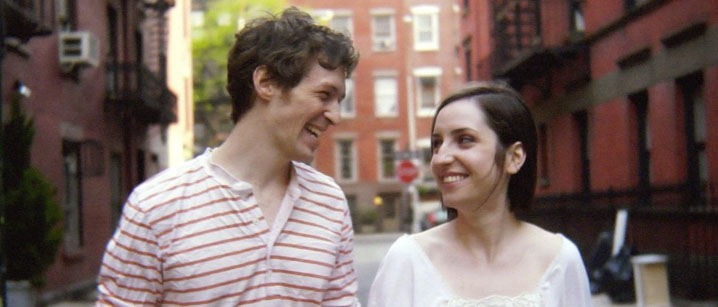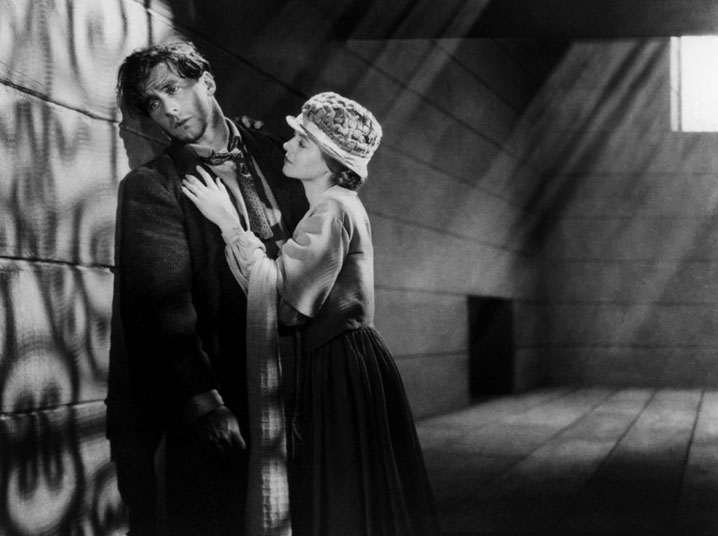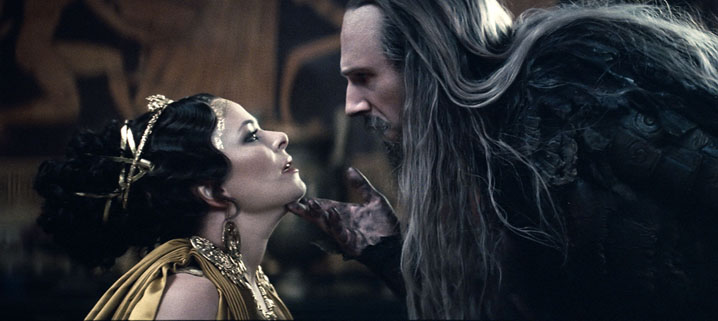

A funny thing happened on the way to the weekend. Tim Blake Nelson's Leaves of Grass, with Ed Norton playing twin brothers — the gag being, of course, that they're often both onscreen in the same scenes à la Nicolas Cage in Adaptation — was all set for a limited release today. Mid-week, though, it looked as if it'd been yanked and bumped to summer. Not usually a good sign, but in this case, thanks to SXSW audiences' warm response to the comedy, Telepathic Studios has picked it up for a wider release. Anne Thompson has the story; let's hope all's well that ends well.
As for what is opening this week, let's stick for a moment to the matter of indies swimming upstream. "It may be hard to imagine how someone could make a feature-length romantic comedy in New York City for just under $15,000, but Daryl Wein and Zoe Lister-Jones managed to do it," writes Larry Rohter in the New York Times. "The making of Breaking Upwards, which opens Friday both at the IFC Center and on cable through video on demand, is almost a tutorial in how a do-it-yourself ethos can overcome the tough economics of the movie business."
But can it? IndieWIRE's Eugene Hernandez argues that Breaking Upwards has "a decent shot" at breaking even. Interviews with Wein and Lister: Jeffrey M Anderson (Cinematical) and Alicia van Couvering (Filmmaker).
And the film itself? "It could be an insufferably precious scenario," writes Mark Jenkins for NPR: "two actual paramours playing two fictional paramours who negotiate a possible breakup. Well, the semi-autobiographical, microbudgeted Breaking Upwards is indeed precious. But it's also smart, witty and less self-absorbed than you might reasonably expect." More from Jeannette Catsoulis ("thoroughly charming," NYT), Joseph Jon Lanthier (2½ out of 4 stars, Slant), Andrew O'Hehir (Salon), Lisa Rosman (IFC), James van Maanen and Chuck Wilson (Voice).
"Written and directed by the Ethiopian-born filmmaker Haile Gerima (Sankofa, Ashes and Embers) over more than a decade, [Teza] is an autobiographical drama about a rural villager who journeys to Europe from Ethiopia and back again," writes Matt Zoller Seitz in the NYT. "He sees his country transformed from a pseudomonarchial dictatorship into an equally savage Marxist hellhole; gains an education and loses his innocence; falls in and out of love; makes and loses friends; and endures enough trauma to fill nine lives. Yet he ultimately finds reason to truly live again, rather than merely exist." And the film "soars, thanks to Mr Gerima's bracingly direct storytelling."
More from Andrew Schenker (Voice). Back in the NYT, Larry Rohter profiles Gerima, who also teaches at Howard University. Teza opens today at the Lincoln Plaza Cinema in Manhattan.

To the revivals! "Every discussion of camera movement and its marriage to meaning begins with Sunrise, a Hollywood 'prestige' project that left 20s audiences cold (it debuted exactly two weeks before The Jazz Singer instantly turned silent film into yesterday's jalopy), but remains one of the medium's genuinely fresh experiences, despite the hoke of the wayward-man-reuniting-with-faithful-wife plot." Michael Atkinson in the Voice: "[T]he achievement of Murnau and his team is having made the film move in ways that aren't narrative, only poetic. Of course Sunrise is on DVD, but living it in a dark theater is a true opportunity."
And New Yorkers can take it at Film Forum for a week. More from Richard Brody (New Yorker) and Nicolas Rapold (Time Out New York).
To mark its 50th anniversary, Alfred Hitchcock's Psycho is being re-released in the UK, and you'll find brief but loving tributes from Peter Bradshaw in the Guardian and David Jenkins in Time Out London.
Now then. About that shower scene. "Though Norman Bates dispatches with the hapless Marion Crane in less than a minute," writes Susan Kandel in the Los Angeles Times, "shooting the scene took seven days, 78 camera setups, the eleventh-hour addition of Bernard Herrmann's shrieking score for strings, several yards of flesh-colored moleskin, an actress, a stand-in and a body double — the last of which is the putative subject of Robert Graysmith's ultimately baffling The Girl in Alfred Hitchcock's Shower."
Yes, this is the very same real-life true-crime author Robert Graysmith portrayed by Jake Gyllenhaal in David Fincher's Zodiac and his intention was to write his latest book about Marli Renfro. "When you can't see [Janet] Leigh's face in the shots, you're looking at her body double," writes Will Hodgkinson in the Guardian. Going on a 2001 AP report, Graysmith believed she'd been murdered; after a bit of digging, though, he now "suggests that Kenneth Dean Hunt was a Psycho obsessive who wanted to kill Leigh's body double but got the stand-in by mistake." Almost too perfect, isn't it.
"As all Hitchcockians know," writes Jonathan Romney in Sight & Sound, "a macguffin is the object of desire in a narrative — the thing that everyone is chasing, but that really has no function except to make the story happen.... In Double Take, Alfred Hitchcock himself is the macguffin — the protean, elusive mystery around which Johan Grimonprez's extraordinary montage revolves." 4 out of 5 stars from the Guardian's Peter Bradshaw: "This is arguably a rather cerebral and indulgent reverie, but there is fascination, and something genuinely disturbing, in every frame."
SELECT CITIES
"As a music-video director (Everlong, Fell in Love With a Girl), Michel Gondry excelled at making childlike dream worlds real," writes Karina Longworth in the Voice. "[A]s a fiction filmmaker (Eternal Sunshine of the Spotless Mind, The Science of Sleep), he's best when giving hyper-cinematic form to the raw inner lives of modern man-children. It's a shock, then, that The Thorn in the Heart, Gondry's documentary about his own family, is so unimaginative and inaccessible." More from Mike Hale (NYT), Noel Murray (AV Club), Nicolas Rapold (TONY), Michael Joshua Rowin (L) and James van Maanen. For Filmmaker, Damon Smith talks with Gondry "about family, television, real-life stories versus feature filmmaking, and the respect we owe an older generation." More Gondry interviews: Aaron Hillis (IFC), Eric Hynes (Reverse Shot, video), Miranda Siegel (Vulture) and ST VanAirsdale (Movieline).

"Quirky goes a surprisingly long way before stalling out in Don McKay, an oddball comedy with the knowing, festering heart of a neo-noir," writes Manohla Dargis in the NYT. Writing for IFC.com, Lisa Rosman agrees that "writer/director Jake Goldberger's first contribution to the twisty thriller (and first feature overall), doesn't provide us with enough simple pleasures to distract us from noticing that it breaks no molds." With Thomas Haden Church, Elisabeth Shue and Melissa Leo. More from Jeannette Catsoulis (NPR), Michelle Orange (Voice) and James van Maanen. Craig Kennedy interviews Goldberger.
TONY's David Fear on The Greatest: "There are films that examine the healing process following a loved one's death with poignancy, profundity and insight about the human condition. And then there's straight-up grief-porn like Shana Feste's shameless sucker-punch of a drama, which romps all over the emotional messiness of mourning like a frenetic feline on a catnip-covered floor." With Carey Mulligan, Pierce Brosnan and Susan Sarandon. More from Stephen Holden (NYT), Lisa Rosman (IFC), Andrew Schenker (Slant), Scott Tobias (AV Club) and Chuck Wilson (Voice).
"Based loosely on the 1973 kung fu classic The Blood Brothers, The Warlords relies too much on combat movie clichés and corny sentiment, weighted down by speeches about heroism and hypocrisy, and bloody illustrations of how War Is Hell," finds Noel Murray at the AV Club. With Jet Li, Andy Lau and Takeshi Kaneshiro. More from Simon Abrams (L), Jeannette Catsoulis (NYT), Mark Jenkins (NPR), Rob Nelson (Voice), Nick Schager (Slant) and Keith Uhlich (TONY).
NATIONWIDE
"Over on my blog, Racialicious, any discussion of Tyler Perry immediately becomes polarized, with fans and detractors fighting for comment space," writes Latoya Peterson in Salon. "Does Tyler Perry really speak to the black community, or just a small, primarily religious and middle-class portion of it? Do his movies condone domestic violence? Should we support his movies regardless of what we think of them, knowing there are so few successful black filmmakers? And don't even get readers started on Medea — the wisecracking, pistol-packing grandma with a heart of (tarnished) gold, the role that catapulted Perry to fame. The debate gets louder with each new release [and today it's Why Did I Get Married Too?], but the argument boils down to one question: Does Perry's importance as a black filmmaker — who uses actors and actresses of color — outweigh the mediocrity of his work?"
WORLDWIDE
"Louis Leterrier's Clash of the Titans may be a re-do of the beloved 1981 Ray Harryhausen fantasy saga, but in its thudding rock soundtrack, its grim, bloody vision of ancient Greece, and its horror-movie-monstrous mythological beasts, the template the film really follows is that of the Playstation's God of War franchise," argues Nick Schager. "In said comparison, this would-be blockbuster comes out looking downright woeful, paralleling the video game series' nominal narrative concerns — namely, a hero's quest to exact vengeance on, and thus end the rule of, Mount Olympus' deities — and yet lacking not only its aesthetic originality but also its fiery, all-consuming sense of rage, anguish and bloodlust."

More from Brad Brevet, Todd Brown (Showcase), Richard Corliss (Time), Manohla Dargis (NYT), Roger Ebert (Chicago Sun-Times), Ed Gonzalez (Slant), Tom Huddleston (Time Out London), Shawn Levy (Oregonian), Scott Marks, Drew McWeeney (Hitfix), Michelle Orange (Movieline), Keith Phipps (AV Club), James Rocchi (MSN Movies), Sukhdev Sandhu (Telegraph), Dana Stevens (Slate, where Daniel Engber explains why the film's half-assed extra layer of 3D spells bad news for the industry), Scott Weinberg (Cinematical), Greg Yolen (Twitch) and Stephanie Zacharek (Salon).
Interviews with Leterrier: Borys Kit (Hollywood Reporter), Mike Ryan (Vanity Fair) and Steven James Taylor (Techland).
Here in The Notebook, Glenn Kenny offers "A Brief History Of Big F**king Scorpions In Cinema."
For news and tips throughout the day every day, follow @theauteursdaily (RSS).